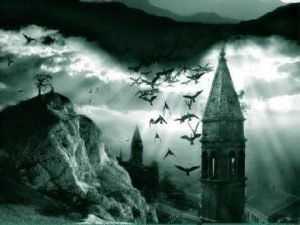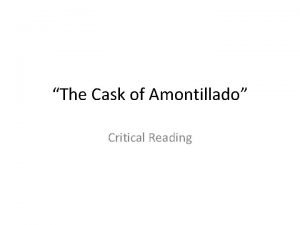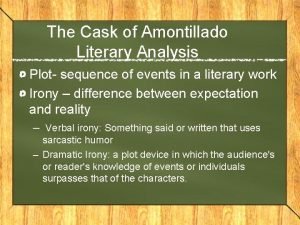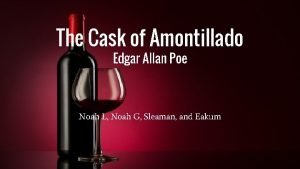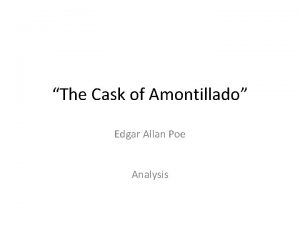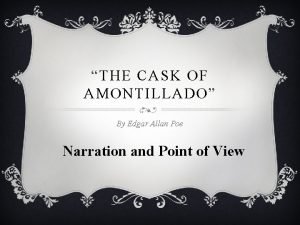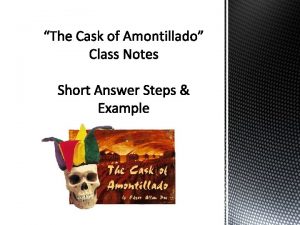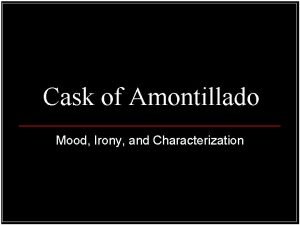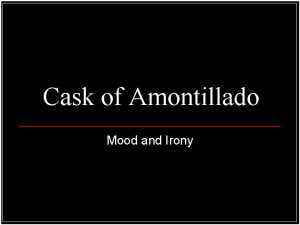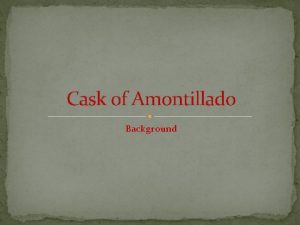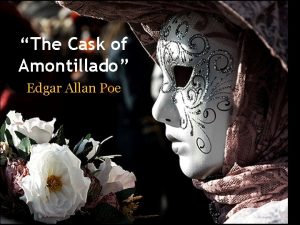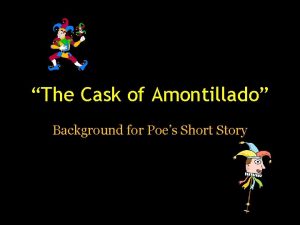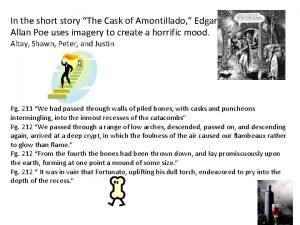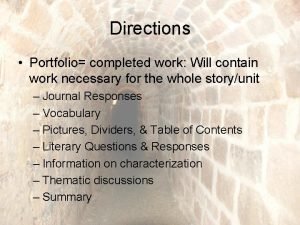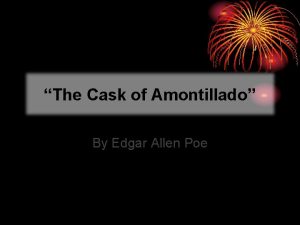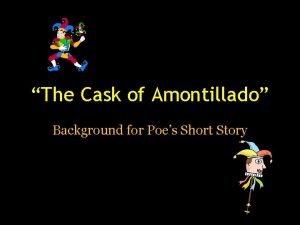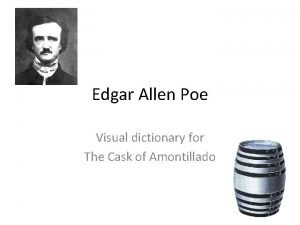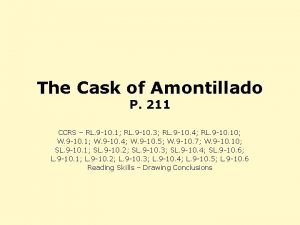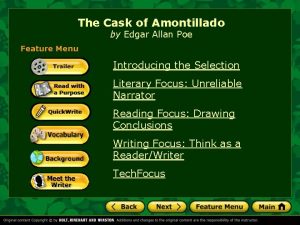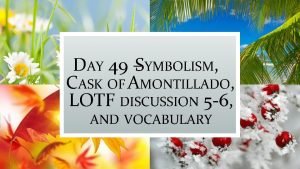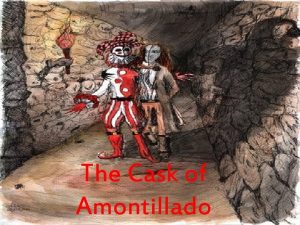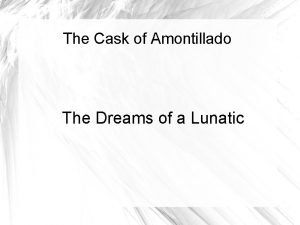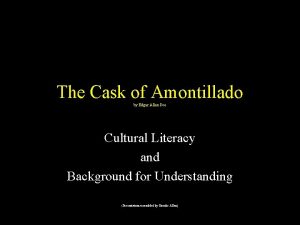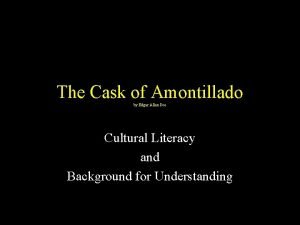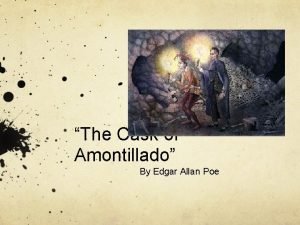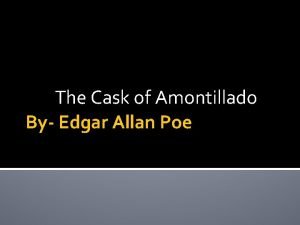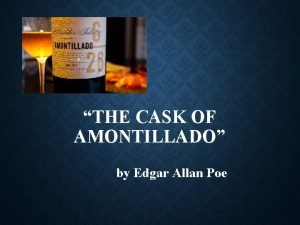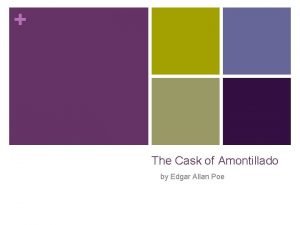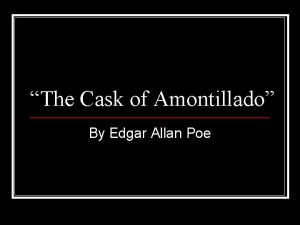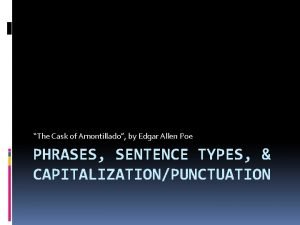The Cask of Amontillado Answers to Questions 1





















































- Slides: 53


The Cask of Amontillado Answers to Questions

1. What is Amontillado?

1. What is Amontillado? Amontillado is a type of Spanish sherry wine. Poe needed something to lure Fortunato underground where Montresor could chain him to the rock wall and leave him to die. Wine was the best lure because Fortunato loved wine and was already drunk when Montresor found him in the street. But what kind of wine? It obviously couldn't be Italian wine because there was an abundance of that at all times, and especially during the "supreme madness" of the carnival. Montresor couldn't say that it was French wine because he was French himself and was a connoisseur of wine. He twice offers Fortunato French wines when they are down in the catacombs: Medoc and De Grave. The only other alternative was a Spanish wine. The Spanish export a lot of sherry, and the finest sherry is Amontillado. The Amontillado, of course, never really existed.

2. Why did Montresor seek revenge on Fortunato?

2. Why did Montresor seek revenge on Fortunato? Edgar Allan Poe’s story “The Cask of Amontillado” ventures into the world of retribution. The entire story surround’s the main character’s desire for vengeance for an insult. This was the final straw after “the thousand injuries” that Montresor had suffered at the hands of the Fortunato. Montresor doesn't specify the insult he received from Fortunato. But he doesn't mention any of the thousand injuries either. Poe wanted to make his story as short as possible, in accordance with his rationale that there should be no unnecessary word in a short story; and if he got into describing a lot of injuries it would add many words of explanation. Also, if Poe explicitly stated the insult, readers might not be satisfied that the insults really merited such serious revenge.

3. How did Montresor know the house would be empty?

3. How did Montresor know the house would be empty? Montresor knew the house would be empty because the Italian carnival was going on and all of the house servants would be out partying. He cleverly used this to his advantage to lure Fotunado back to his house to get his revenge. Montresor told his servants he was going out for the evening, and to stay in the house. He comments wryly that: "These orders were sufficient, I well knew, to insure their immediate disappearance, one and all, as soon as my back was turned. "

4. Explain the Significance of Montresor’s statement “At length I would be avenged: this was point definitely settled. . . I must not only punish but punish with impunity. A wrong is unredressed when retribution overtakes its redresser. It is equally unredressed when the avenger fails to make himself felt as such to him who has done the wrong. ”

4. Explain the Significance of Montresor’s statement “At length I would be avenged: this was point definitely settled. . . I must not only punish but punish with impunity. A wrong is unredressed when retribution overtakes its redresser. It is equally unredressed when the avenger fails to make himself felt as such to him who has done the wrong. ” To understand the quotation it is important to define these words: Impunity - freedom from punishment or to receive immunity Redresser - the person seeking revenge Unredressed - unable to set things right or repair

4. Explain the Significance of Montresor’s statement “At length I would be avenged: this was point definitely settled. . . I must not only punish but punish with impunity. A wrong is unredressed when retribution overtakes its redresser. It is equally unredressed when the avenger fails to make himself felt as such to him who has done the wrong. ” Montressor intends to make Fortunato pay for the wrongs done to him, which Fortunato never set right. But in the process he intends to escape retribution himself, believing to be caught would be a perversion of justice.

4. Explain the Significance of Montresor’s statement “At length I would be avenged: this was point definitely settled. . . I must not only punish but punish with impunity. A wrong is unredressed when retribution overtakes its redresser. It is equally unredressed when the avenger fails to make himself felt as such to him who has done the wrong. ” Here Poe plays with the idea that “He who would seek vengeance must dig two graves, ” a concept that frequently appears in the revenge tragedies that “Cask” resembles. Though revenge tragedies conventionally end with both the revenger and his victim(s) dead, Montresor decided early in his plan that the only true revenge is the kind that you’re around to enjoy after.

5. In your own words, describe the catacombs that Fortunato is led through.

5. In your own words, describe the catacombs that Fortunato is led through. “The catacombs were a very eerie and ominous place. The air was overwhelmingly shrouded with nitre, so much so that it became very difficult to breathe. It was musty and soggy, but dry dust seemed to cover every surface. There was a faint smell of wine, masked by the many other suppressing smells, but you could taste it in the air. The tunnel was very dark and full of shadows, with many confusing hallways and stairways that one could easily get lost in. The ceilings were all arched and very low, and there what seemed to be hundreds of unlocked doors with pure darkness behind them. ”

6. Where and when is the story set? Give reasons for your answer.

6. Where and when is the story set? Give reasons for your answer. The story is set in Italy during the 19 th century. It is the day before Ash Wednesday (Lent), during carnival season; which is known as Mardi Gras in America. Ø The names of the characters (Montresor, Fortunato, Luchesi) are all Italian. Ø Throughout the whole story Fortunato is dressed a jester Ø The story was written by Edgar Allen Poe in 1846

7. Why does Montresor make sure Fortunato has drunk a lot of wine?

7. Why does Montresor make sure Fortunato has drunk a lot of wine? He wants to get Fortunado a little drunk so he’ll be calm and his reactions will be slowed. Since alcohol is a depressant it slows down the body and if Fortunado is calm and stationary then he is easier to trap and keep dazed. Also, Fortunado was affected by the nitre in the catacombs and used wine as a medoc to keep it under control.

8. What is Luchesi’s role in the story?

8. What is Luchesi’s role in the story? Luchesi is a fellow wine connoisseur and friend of Montresor and Fortunato. He is used as bait to lure Fortunato into Montresor’s trap. Montresor asks for Fortunato to come verify the bottle he just received is really Amontillado. Pretending to fear for Fortunato’s health amidst the damp catacombs, Montresor offers to simply have Luchesi do it. Fortunato believes that Luchesi does not know wine as well as he does and insists that he have a look at this famous Amontillado.

9. What preparations had Montresor made for his revenge?

9. What preparations had Montresor made for his revenge? To prepare for his plan, Montresor emptied the house, prepared the catacombs, came up with a brilliant story to lure Fortunato, waited for a night where he would not be missed among the crowds of people celebrating in the carnival, and got Fortunato completely drunk. He lured Fortunado to his house and he also set a shovel and lots of mortar and stone in a crypt deep within his catacombs where he would lead Fortunado. He planned to bury him alive within a wall of stone.

10. Why does Montresor appear concerned about Fortunato’s health?

10. Why does Montresor appear concerned about Fortunato’s health? Montresor appears to be concerned about Fortunato’s health because he wants to make it seem like it isn’t a trap and that he is actually showing Fortunato the wine because they are friends and not because he wants to kill him. Montresor wants to build up trust and determination in Fortunato but telling him he should go back because of his health but Fortunato wants to keep on going, which Montresor’s plan all along.

11. Montresor describes his family coat of arms in the following manner: "A huge human foot d'or, in a field azure; the foot crushes a serpent rampant whose fangs are imbedded in the heel. " How does this description serve as foreshadowing in the story, and what do the objects represent?

11. Montresor describes his family coat of arms in the following manner: "A huge human foot d'or, in a field azure; the foot crushes a serpent rampant whose fangs are imbedded in the heel. " How does this description serve as foreshadowing in the story, and what do the objects represent?

11. Montresor describes his family coat of arms in the following manner: "A huge human foot d'or, in a field azure; the foot crushes a serpent rampant whose fangs are imbedded in the heel. " How does this description serve as foreshadowing in the story, and what do the objects represent? Montresor’s family coat of arms extends the idea of retribution. A foot crushes the snake [a wrong has been done] with the snake turning its head and biting the foot [the wrong has been avenged].

12. How does not knowing what Fortunato did to Montresor intensify the horror of this story?

12. How does not knowing what Fortunato did to Montresor intensify the horror of this story? From the story's first sentence to the last, the reader is left to wonder what "insult" could have been so hurtful as to cause Montresor to create such a horrific punishment for Fortunato. The horror of this story lies not only in Fortunato's punishment but also in the unknown cause of his punishment. Under normal circumstances, we judge a person's actions in part on the basis of the cause of those actions. Without knowing the cause, we are left in a kind of moral limbo--we can't assign blame to either Montresor or Fortunato because we never know what Fortunato has done, and without knowing that, we cannot decide whether Montresor is reacting appropriately (assuming murder is appropriate to any situation) or is, to put it bluntly, crazy.

12. How does not knowing what Fortunato did to Montresor intensify the horror of this story? Fortunato's guilt can never be measured because we don't know what to measure. We can conclude, based on the narrative, that Fortunato is an arrogant, prideful man, but those attributes don't seem sufficiently bad to justify murder. We can also conclude that Montresor is a vengeful murderer, but we can't judge him on a moral basis because we are missing the cause of his hatred. The horror of Fortunato's death, and the logical, methodical way Montresor has arranged it, is compounded by the fact that we can never understand Montresor's motivation, and motivation is key to rendering a moral judgment on someone's actions. We are left, as all readers have been, horrified by a truly inexplicable revenge, and that leaves us in a moral vacuum--a horrible place to be.

13. Explain the Significance of Montresor’s statement: "You are a man to be missed. "

13. Explain the Significance of Montresor’s statement: "You are a man to be missed. " Clearly the word "missed" hints at the foreshadowing of Fortunato's death. Fortunato is a man who will soon be missed, at least by his wife, since he will no longer be seen again after Montresor finishes his murderous plan. It is foreshadowing because it prepares us for the idea that something might happen to Fortunado, and we might begin to question Montresor's motives. It is also ironic that Montresor states that "I cannot be responsible, " because, of course, he will be responsible for Fortunato's death.

14. Do you think Montresor’s crime will ever be discovered? Why or why not?

14. Do you think Montresor’s crime will ever be discovered? Why or why not? “I don’t think his crime will ever be discovered because for starters, Fortunado’s body was hidden in a niche covered by a wall of stone deep within dark catacombs. The odds are extremely low of anyone discovering Fortunado’s body. Also, at the end of the story Montresor says, “For the half century no mortal has disturbed them. ” He is referring “them” as the bones and bodies in the catacombs. If 50 years passed with nobody finding the bones or bodies then I don’t think anyone will. Montresor performed the crime with such precision and efficiency that you wouldn’t have seen it coming. ”

15. Why is Fortunato's name ironic in "The Cask of Amontillado"?

15. Why is Fortunato's name ironic in "The Cask of Amontillado"? The name Fortunato sounds very much like the word fortunate. Of course, Fortunato is anything but lucky. He is manipulated by Montressor and led to his untimely and horrific death. So the irony lies in the fact that a man whose name would indicate good fortune ends up with the very ill fortune of being buried (or technically walled up) alive--not very fortunate at all.

16. What are some examples of irony used in the story The Cask of Amontillado?

16. What are some examples of irony used in the story The Cask of Amontillado? “The Cask of Amontillado” is loaded with situational, dramatic, and verbal irony.

16. What are some examples of irony used in the story The Cask of Amontillado? Examples of situational irony, when one thing is expected but the opposite happens, are numerous. First, the word “cask” means “wine barrel, ” but casket, or coffin, also comes from the same word, so although Fortunato believes he will ultimately reach a cask of wine, he actually meets his casket. Next, the name “Fortunato” means “fortunate” in Italian, but Fortunato is actually very unfortunate in all actuality. Finally, although Fortunato is dressed as a joyous court jester, his festive outfit contrasts with the ghastly fate that awaits him.

16. What are some examples of irony used in the story The Cask of Amontillado? Dramatic irony, when the reader or a character knows something that another character does not, is also evident in the story. Fortunato then tells Montresor not to worry about his health and that “the cough is a mere nothing; it will not kill [him]. [He] will not die of a cough. ” Montresor then replies, “True–true. ” The reader at this point can almost see a devilish gleam in Montresor’s eyes, for he knows exactly how Fortunato will die. ”

16. What are some examples of irony used in the story The Cask of Amontillado? Verbal irony is when one thing is said but another is meant. For example, when Montresor runs into Fortunato at the beginning of the story, he says, “My dear Fortunato, you are luckily met. ” However, he actually means that he himself is happy to see Fortunato because he will profit from this meeting, not Fortunato. While traveling into the catacombs, Fortunato asks Montresor if he is a mason, meaning a Freemason, and Montresor says yes. Yet, Montresor means that he is a craftsman, since he will be entombing Fortunato with stone and mortar.

16. What are some examples of irony used in the story The Cask of Amontillado? Verbal irony is when one thing is said but another is meant. Later, Montresor appears to be worried about Fortunato’s health as they travel deeper into the catacombs and says, “We will go back. Your health is precious. ” However, he has no intention of going back and is not worried about Fortunato’s health. He is actually using reverse psychology to lure him further in. Finally, Montresor brings out some wine to toast “to [Fortunato’s] long life. ” However, he actually means to toast to his inevitable death.

17. What role does Fortunato's “weak point” play in the narrator's revenge?

17. What role does Fortunato's “weak point” play in the narrator's revenge? Montresor's plot for revenge hinges on a critical fact; Fortunato believes himself to be an expert on the taste and authenticity of wine. Because of this, Fortunato will be not only willing but insistent on verifying Montresor's fictional cask of Amontillado wine, in order to prove himself superior to Luchresi, a locally-accepted expert.

17. What role does Fortunato's “weak point” play in the narrator's revenge? Montresor needs to get Fortunato into the catacombs of his own free will; note that each time Montresor asks Fortunato to return, Fortunato insists on continuing to find the cask. Because of this, Montresor doesn't need to do anything drastic, such as drugging Fortunato or knocking him out; Fortunato willingly goes to his doom, assured that Montresor has only his best interests at heart. Had Fortunato not been so egotistical (and also drunk), he would have not been so eager to one-up Luchesi; however, his ego forces him to prove his expertise, as Montresor expected from the start.

18. What are some examples of foreshadowing in the Story? Explain how/what they foreshadow

18. What are some examples of foreshadowing in the Story? Explain how/what they foreshadow Montresor gives both his audience and Fortunato hints as to his real motives throughout. As they are moving through the catacombs, Fortunato begins coughing violently & Montresor feigns concern, telling him they will turn back for his health. “Come, ” I said, with decision, “we will go back; your health is precious. You are rich, respected, admired, beloved; you are happy, as once I was. You are a man to be missed. For me it is no matter. We will go back; you will be ill, and I cannot be responsible. Besides, there is Luchesi—” “Enough, ” he said; “the cough's a mere nothing; it will not kill me. I shall not die of a cough. ” “True—true, ” I replied; “and, indeed, I had no intention of alarming you unnecessarily—but you should use all proper caution. A draught of this Medoc will defend us from the damps. Fortunato claims he will not die of a cough, & Montresor replies "Truetrue. " He is telling the reader and his victim that he is well aware of how Fortunato will die, for Montresor himself will cause his death.

18. What are some examples of foreshadowing in the Story? Explain how/what they foreshadow One other example of foreshadowing is Fortunato's costume. He is wearing the traditional garb of the fool for the Venetian carnival. Poe describes it thus: The man wore motley. He had on a tight-fitting parti-striped dress, and his head was surmounted by the conical cap and bells. Thus, Fortunato is dressed as a jester, a clown. This foreshadows the role he will play in the story-Montresor's fool. As he becomes progressively more drunk, he becomes sillier and more pathetic, fulfilling the clown role.

19. Provide two examples of how the reader knows that Fortunato is a drunk.

19. Provide two examples of how the reader knows that Fortunato is a drunk. Fortunato has a “weak point, ” his love of wine. He knows his fine wines, and so does the narrator. (Translation: they are both alcoholics. ) At sundown on the night in question, the narrator meets his “friend” Fortunato already has a good drunk on, and he’s dressed like a jester. Fortunato walks shakily, and the bells on his cap jingle as a result. In the catacombs the narrator gives Fortunato another bottle of wine. Fortunato makes a toast to the dead resting in peace around them, and comments on how big the catacomb is.

20. How is theme, “What goes around comes around” brought out in the story?

20. How is theme, “What goes around comes around” brought out in the story? REVENGE: What goes around comes around. The force that drives Montresor to commit the horrible murder of Fortunato is his powerful desire for revenge. His first words in the story speak of it: "The thousand injuries of Fortunato I had borne as best I could; but when he ventured upon insult, I vowed revenge. " The idea of revenge is repeated several times in the opening paragraph. Montresor will not rush to act, he says, but "at length I would be avenged"; he is determined to "not only punish, but punish with impunity. " The terms of the revenge are quite clear in Montresor's mind. He will not feel fully revenged unless Fortunato realizes that his punishment comes at Montresor's hand; a wrong is not redressed "when the avenger fails to make himself felt as such to him who has done the wrong. " In seeking revenge, Montresor is acting out the motto of his family.

R I P
 What is amontillado
What is amontillado When montresor offers the medoc wine to fortunato
When montresor offers the medoc wine to fortunato The cask of amontillado literary elements
The cask of amontillado literary elements The cask of amontillado
The cask of amontillado The cask of amontillado by edgar allan poe summary
The cask of amontillado by edgar allan poe summary The cask of amontillado point of view
The cask of amontillado point of view Background of the cask of amontillado
Background of the cask of amontillado The black cat story summary
The black cat story summary Plot diagram of the cask of amontillado
Plot diagram of the cask of amontillado The cask of amontillado man vs society
The cask of amontillado man vs society Cask of amontillado sequencing quiz
Cask of amontillado sequencing quiz Whats direct characterization
Whats direct characterization The cask of amontillado irony examples
The cask of amontillado irony examples The cask of amontillado mood
The cask of amontillado mood Poe the catacombs
Poe the catacombs The cask of amontillado verbal irony
The cask of amontillado verbal irony The conqueror worm
The conqueror worm Nitre definition cask of amontillado
Nitre definition cask of amontillado Where does the cask of amontillado take place
Where does the cask of amontillado take place Imagery in cask of amontillado
Imagery in cask of amontillado Characterize montresor. what kind of person is he
Characterize montresor. what kind of person is he The cask of amontillado tone
The cask of amontillado tone Poe
Poe The cask of amontillado background
The cask of amontillado background Palazzo definition cask of amontillado
Palazzo definition cask of amontillado Allusion meaning definition
Allusion meaning definition The cask of amontillado drawing
The cask of amontillado drawing Cask of amontillado pov
Cask of amontillado pov The cask of amontillado full text
The cask of amontillado full text The cask of amontillado anticipation guide
The cask of amontillado anticipation guide Symbolism in the cask of amontillado
Symbolism in the cask of amontillado Answer the questions write the answers in your notebook
Answer the questions write the answers in your notebook Hình ảnh bộ gõ cơ thể búng tay
Hình ảnh bộ gõ cơ thể búng tay Frameset trong html5
Frameset trong html5 Bổ thể
Bổ thể Tỉ lệ cơ thể trẻ em
Tỉ lệ cơ thể trẻ em Voi kéo gỗ như thế nào
Voi kéo gỗ như thế nào Tư thế worm breton
Tư thế worm breton Hát lên người ơi
Hát lên người ơi Các môn thể thao bắt đầu bằng tiếng chạy
Các môn thể thao bắt đầu bằng tiếng chạy Thế nào là hệ số cao nhất
Thế nào là hệ số cao nhất Các châu lục và đại dương trên thế giới
Các châu lục và đại dương trên thế giới Cong thức tính động năng
Cong thức tính động năng Trời xanh đây là của chúng ta thể thơ
Trời xanh đây là của chúng ta thể thơ Mật thư anh em như thể tay chân
Mật thư anh em như thể tay chân 101012 bằng
101012 bằng độ dài liên kết
độ dài liên kết Các châu lục và đại dương trên thế giới
Các châu lục và đại dương trên thế giới Thể thơ truyền thống
Thể thơ truyền thống Quá trình desamine hóa có thể tạo ra
Quá trình desamine hóa có thể tạo ra Một số thể thơ truyền thống
Một số thể thơ truyền thống Bàn tay mà dây bẩn
Bàn tay mà dây bẩn Vẽ hình chiếu vuông góc của vật thể sau
Vẽ hình chiếu vuông góc của vật thể sau Nguyên nhân của sự mỏi cơ sinh 8
Nguyên nhân của sự mỏi cơ sinh 8
